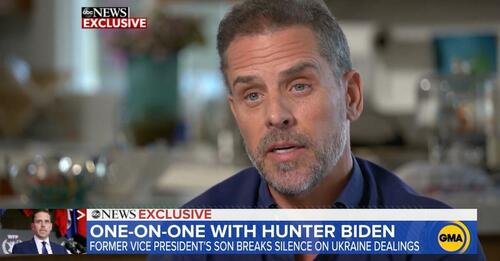
For months, I have been expressing disbelief that Hunter Biden and his defense team were going to take the gun case to trial. Even on the eve of the trial, I thought that the defense might snap into sanity and plead out the case. The reason was simple. A guilty plea would have materially improved the chances that Hunter could get probation and avoid jail by accepting responsibility. Conversely, a trial in a case with overwhelming evidence of guilt would make it less likely that a judge would depart from the guidelines at sentencing. Nevertheless, Hunter went forward with a nullification strategy and, in so doing, it may have nullified his best chance to reduce the risk of jail time.
After the verdict, I have been stating that jail time is a real possibility in this case despite the fact that this is a first offender. Frankly, I do not see any real need for incarceration in this type of case and many judges would be likely tempted to grant “downward departures” in sentencing or disregard any recommended prison sentence.
It is also important to note that, after the Supreme Court’s ruling in United States v. Booker, sentencing guidelines are discretionary. Judge Maryellen Noreika could sentence him to probation in light of his struggle with his addiction and his status as a first offender (as well as the absence of other aggravating factors).
Yet, while many view this as a relatively minor offense, the sentencing guidelines do not.
Judges regularly sentence people to prison for these offenses. The sentencing guidelines put the recommendation at 15 to 21 months in prison. Moreover, over 90 percent of those convicted are sentenced to prison time.
The chances of probation are increased with guilty pleas, which generally allow for a downward departure of two levels for taking responsibility. That may not seem like a lot but it could prove determinative for a judge on a marginal call over the need for incarceration. By pursuing the nullification strategy, Hunter lost that benefit and now would have to belated accept responsibility just before sentencing after putting the court and public through a trial.
If the defense reviewed Judge Noreika’s past cases, they would have seen that she takes a tough approach on gun cases. In May, she sentenced defendant Zhi Dong to a year in jail for lying about his address on a gun form. Notably, that was twice the recommended sentence of the prosecutors.
One point of distinction is that Dong purchased 19 pistols and 10 “lower receivers” rather than the single gun purchased by Biden. It is also notable that the prosecutors were only seeking six months of incarceration in that arguably more serious case.
The defense strategy also makes it more difficult for Special Counsel David Weiss, who has shown remarkable lenience at critical stages of his investigation. It was Weiss who allowed the most serious tax offenses to lapse under a statute of limitations (despite reportedly having an agreement to extend the period). It was Weiss who sought to give Hunter an obscene sweetheart deal that would have avoided any jail time and given him immunity for all crimes.
Many remain skeptical of Weiss and his actions in this case. For that reason, the failure to plead guilty puts Weiss in a box. Given the sentencing guidelines of prison time, any recommendations for probation would be read as more favoritism for the president’s son. Weiss may feel compelled to follow the recommendations to show that Hunter is being treated the same as other defendants.
Given the calculation for the three felonies, the defense had to know that they were increasing the chances of prison time by pursuing a nullification defense. The hope was that Wilmington is Bidentown and no local jury would convict the son of the favorite son of Delaware.
It didn’t work out that way. The team seemed to overplay its hand with defenses that were so implausible as to be insulting for the jury. They suggested that Hunter might not have checked the box or signed the form during in a brief window where he was not using drugs. The prosecutors demolished those defenses within two days of the trial.
Accepting responsibility after. a trial does not guarantee a downward departure. For example, in U.S. v. Womack, a defendant sought a departure for accepting responsibility before trial as a drug dealer. However, he still went to trial on other issues and the trial judge refused any departure on the basis of his earlier admissions of guilt. It found that he was still minimizing his responsibility for the underlying crimes. That decision was upheld on appeal.
Now, Hunter may have painted both the prosecutors and the court into a corner. In a play for a hung jury, Hunter may have hoisted himself on his own petard. Guilt was never in doubt, but his efforts also removed any question of accepting responsibility before he was facing actual sentencing for his offenses.
For months, I have been expressing disbelief that Hunter Biden and his defense team were going to take the gun case to trial. Even on the eve of the trial, I thought that the defense might snap into sanity and plead out the case. The reason was simple. A guilty plea would have materially improved the chances that Hunter could get probation and avoid jail by accepting responsibility. Conversely, a trial in a case with overwhelming evidence of guilt would make it less likely that a judge would depart from the guidelines at sentencing. Nevertheless, Hunter went forward with a nullification strategy and, in so doing, it may have nullified his best chance to reduce the risk of jail time.
After the verdict, I have been stating that jail time is a real possibility in this case despite the fact that this is a first offender. Frankly, I do not see any real need for incarceration in this type of case and many judges would be likely tempted to grant “downward departures” in sentencing or disregard any recommended prison sentence.
It is also important to note that, after the Supreme Court’s ruling in United States v. Booker, sentencing guidelines are discretionary. Judge Maryellen Noreika could sentence him to probation in light of his struggle with his addiction and his status as a first offender (as well as the absence of other aggravating factors).
Yet, while many view this as a relatively minor offense, the sentencing guidelines do not.
Judges regularly sentence people to prison for these offenses. The sentencing guidelines put the recommendation at 15 to 21 months in prison. Moreover, over 90 percent of those convicted are sentenced to prison time.
The chances of probation are increased with guilty pleas, which generally allow for a downward departure of two levels for taking responsibility. That may not seem like a lot but it could prove determinative for a judge on a marginal call over the need for incarceration. By pursuing the nullification strategy, Hunter lost that benefit and now would have to belated accept responsibility just before sentencing after putting the court and public through a trial.
If the defense reviewed Judge Noreika’s past cases, they would have seen that she takes a tough approach on gun cases. In May, she sentenced defendant Zhi Dong to a year in jail for lying about his address on a gun form. Notably, that was twice the recommended sentence of the prosecutors.
One point of distinction is that Dong purchased 19 pistols and 10 “lower receivers” rather than the single gun purchased by Biden. It is also notable that the prosecutors were only seeking six months of incarceration in that arguably more serious case.
The defense strategy also makes it more difficult for Special Counsel David Weiss, who has shown remarkable lenience at critical stages of his investigation. It was Weiss who allowed the most serious tax offenses to lapse under a statute of limitations (despite reportedly having an agreement to extend the period). It was Weiss who sought to give Hunter an obscene sweetheart deal that would have avoided any jail time and given him immunity for all crimes.
Many remain skeptical of Weiss and his actions in this case. For that reason, the failure to plead guilty puts Weiss in a box. Given the sentencing guidelines of prison time, any recommendations for probation would be read as more favoritism for the president’s son. Weiss may feel compelled to follow the recommendations to show that Hunter is being treated the same as other defendants.
Given the calculation for the three felonies, the defense had to know that they were increasing the chances of prison time by pursuing a nullification defense. The hope was that Wilmington is Bidentown and no local jury would convict the son of the favorite son of Delaware.
It didn’t work out that way. The team seemed to overplay its hand with defenses that were so implausible as to be insulting for the jury. They suggested that Hunter might not have checked the box or signed the form during in a brief window where he was not using drugs. The prosecutors demolished those defenses within two days of the trial.
Accepting responsibility after. a trial does not guarantee a downward departure. For example, in U.S. v. Womack, a defendant sought a departure for accepting responsibility before trial as a drug dealer. However, he still went to trial on other issues and the trial judge refused any departure on the basis of his earlier admissions of guilt. It found that he was still minimizing his responsibility for the underlying crimes. That decision was upheld on appeal.
Now, Hunter may have painted both the prosecutors and the court into a corner. In a play for a hung jury, Hunter may have hoisted himself on his own petard. Guilt was never in doubt, but his efforts also removed any question of accepting responsibility before he was facing actual sentencing for his offenses.
Loading…






